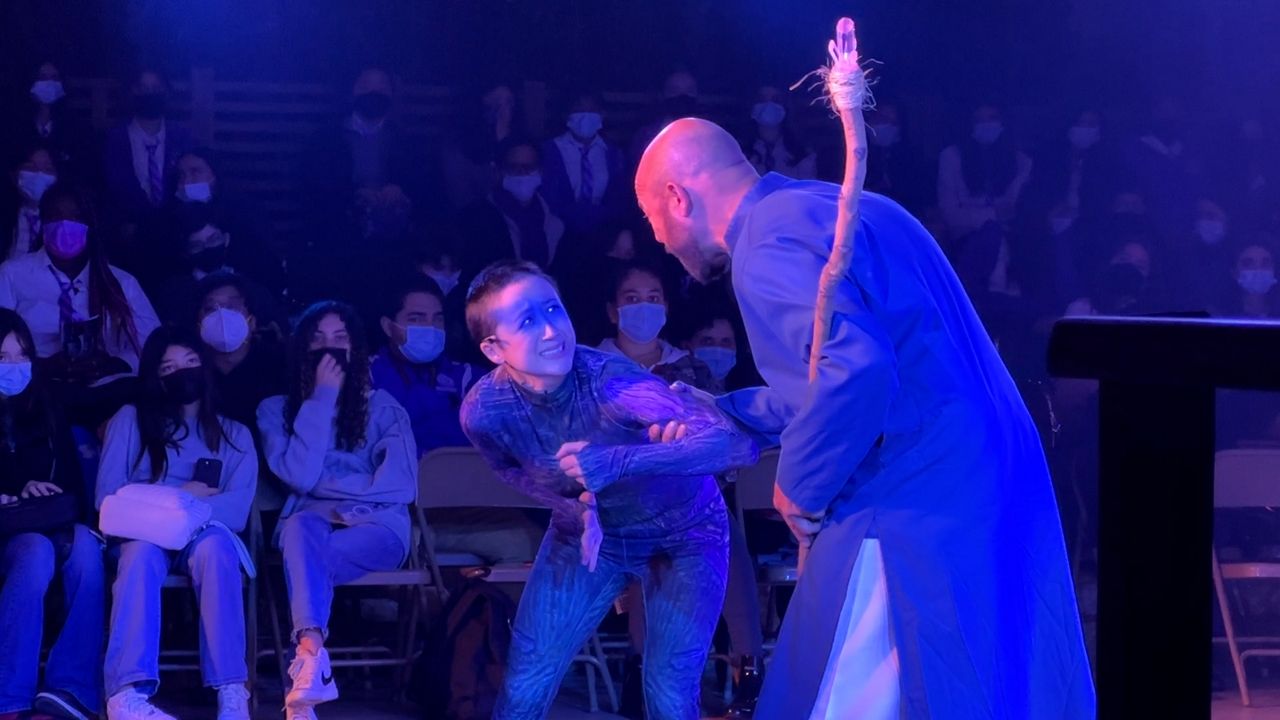LOS ANGELES — On board for some Shakespeare? Set a course for downtown Los Angeles and a new interactive production of "The Tempest."
Arriving at Shakespeare Center LA, audiences don’t just enter the lobby, they embark on a journey, playing a role in running the ill-fated ship and mingling with the characters as the white fabric that serves as a sky grows steadily darker above them.
Once the storm hits, they are tossed into the ocean, which takes them to an enchanted island, populated by mystical creatures and mysterious clues.
At the helm of all of this theatrical sorcery is Graham Wetterhahn, artistic director of After Hours Theatre Company and producer of “The Tempest: An Immersive Experience.” Of all of Bard’s works, he says this one was tailor-made for the immersive treatment.
“There’s a really strong sense of place,” he explained, dressed as a boatswain. “You’re on a mystical, magical island. There’s a shipwreck. It’s very visually exciting. It also takes place in real time and there’s a clear role for the audience. It’s very easy for you to be shipwrecked onto the island.”
Not to mention, Wetterhahn says, the play itself is the complete package.
“It has drama, it has comedy, it has magic, it has romance, it has revenge,” he said. “So there’s a lot of Shakespeare’s really essential pieces all in a very tight to our package.
Wetterhahn has long been producing immersive theatre, experimenting with space, curated flavors, even piped in scents. This is his first co-production with Shakespeare Center LA, who he says was looking for a way to create intimate encounters with the classics.
Even as a theater professional, Wetterhahn admits, Shakespeare can be a bit intimidating.
“A lot of the times I watch Shakespeare, and the first act or two, I’m still trying to figure out the characters,” he admitted. “And so we thought, hey, what would an audience need, to be able to follow along and get invested to the show right out of the gate?”
That’s where the pre-show games come in. His colleague Sara Beil, a theatrical sorcerer who also designs theme parks, created all of the immersive elements, designed the Instagram-worthy spaces, and wrote the puzzles.
“It’s a lot of fun,” Wetterhahn insisted. “But you’re also learning about the characters, about their relationships with each other, about their objectives.”
While the production normally runs at night — complete with custom cocktails — they also perform for school groups. Twelve-year-old Evelynn Vaquez , a self-described Shakespeare nerd, really dove into the experience.
“I feel like I’m actually a part of the play,” she stated, donning a British accent.
That feeling, Chris Butler, isn’t out of the ordinary for Shakespeare. The actor, who plays Prospero, says the Bard was known for breaking the fourth wall.
“Traditionally, what I think is unique about Shakespeare, is that it is by nature immersive, because of all of the asides and how much time Shakespeare’s characters actually interact with the audience,” he explained. “So I think it’s a perfect show that sort of lends itself to even taking it to the next level, which we do here in this production.”

Although this experience is new for him, his relationship with the company is not.
“My very first professional theatre job in Los Angeles was actually given to me by Shakespeare Center LA,” he said with a smile. “I did a production of 'Much Ado About Nothing,' 20-something years ago. So it’s been really nice to consider them sort of my theater home here in Los Angeles.”
At the moment, small theatre companies are trying to weather their own storm. To survive, many are joining forces — sharing resources, finances and, of course, patrons. Wetterhahn sees this collaboration between After Hours and Shakespeare Center LA as a match as perfect as Miranda and Ferdinand.
“We can bring younger audiences and more innovative ideas and they can provide stable infrastructure,” he said. “It’s really essential for creating the next generation of theatre in Los Angeles.”



